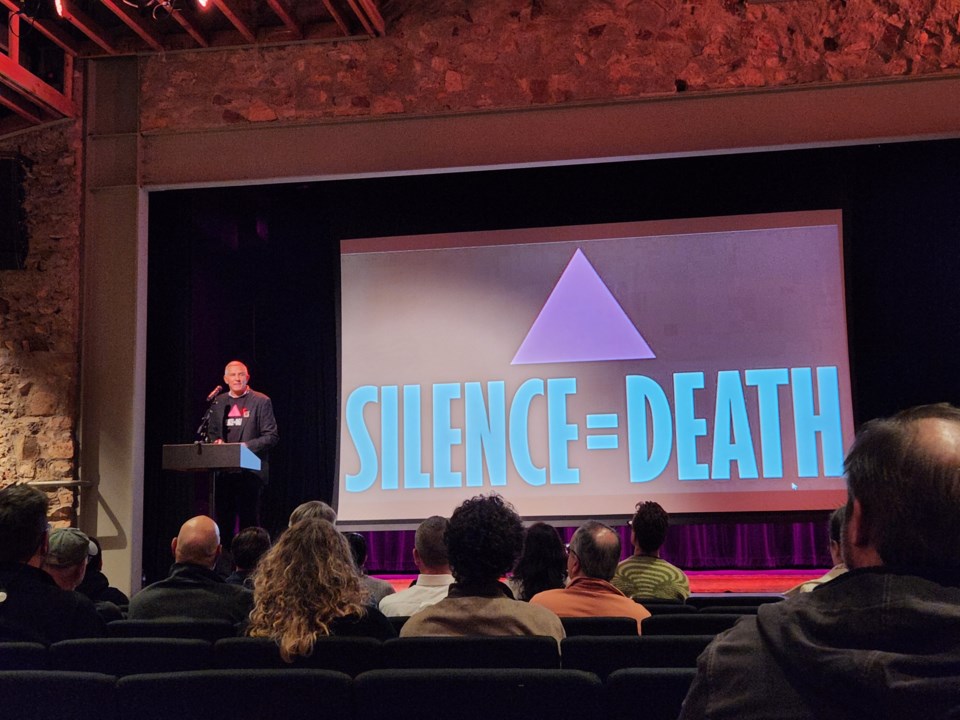Eric Sawyer still chokes up as he remembers the stories of the activists he knew who protested even in death for the government to pay attention to the AIDS crisis 35 years ago.
The University of Colorado Boulder alumnus was a founding member of ACT UP, short for the AIDS Coalition to Unleash Power, based in New York. Sawyer gave a speech about his experiences on Thursday in Boulder in commemoration of World AIDS Day, hosted by the Boulder County AIDS Project, Pride Center at CU Boulder and Out Boulder County.
Sawyer, who was diagnosed with HIV in 1984, recalled the brutal apathy of the American government, media and religious organizations that largely ignored the suffering of AIDS victims, who were initially mostly gay, intravenous drug users or sex workers. He also drew parallels to the COVID-19 pandemic and the recent monkeypox outbreak across the U.S.
“There was no sense of urgency,” Sawyer said of the initial reaction to HIV and AIDS. “The government didn’t really care about it. Society in general wasn’t even covering the disease … So we knew that we were going to have to take some pretty dramatic action to get the government to respond appropriately.”
As part of ACT UP, Sawyer took part in orchestrating some of the historic protests to demand political action and funding to treat the AIDS pandemic through the late ‘80s and ‘90s. That included infiltrating the floor of the New York Stock Exchange, shutting down the Food and Drug Administration for a day, storming the National Institutes of Health, entering the studio of CBS Evening News during the 6 o’clock news and filling Grand Central Terminal with protesters and banners.
The activists also carried ashes of AIDS victims and dumped them on the White House lawn to bring attention to the needless deaths. During that protest, Sawyer carried the ashes of Larry Kert, who was the original Tony in the Broadway production of “West Side Story.”
Kert was supposed to sing at the State Dinner for President George H. W. Bush and planned to ask the president to pay attention and invest money to address the AIDS crisis during his performance, Sawyer said. Kert wasn’t able to perform after the White House conveniently lost his sheet music, according to Sawyer, and he died just two weeks later from complications of AIDS.
“When Ron Pullen, his lover, found out that we were going to do this, he was like, ‘I still have some of Larry’s ashes. I saved some to dump on his favorite beach in Maui. I think it would be more appropriate if you gave Larry his final appearance at the White House,’” Sawyer said, choking up.
Another member of ACT UP, before his death, signed up to have his body carried through the streets of New York in an open casket. He died just a few days before the election where Bush lost to President Bill Clinton.
“We carried his body from a church just below Washington Square Park to the headquarters of the Bush campaign in New York City and had a funeral both for our active member who died and for the Bush administration the night before the election,” Sawyer said with emotion. “... You can tell the political funeral campaigns are something that really cuts me to the core. You’re carrying the bodies of somebody you did actions with and got arrested with through the streets of New York in an open coffin.”
The activists fought to improve the social safety net for the people who were dying of AIDS. At the time, people disabled by a disease like AIDS couldn’t qualify for benefits for three years, but most AIDS victims died after 12-18 months.
They pushed against the stigma and discrimination faced by people with AIDS, as they were often fired or evicted out of fear of their illness.
Sawyer was especially proud of ACT UP’s work to speed up the drug approval process in the United States, which typically took 10-15 years.
“We came up with the idea for compassion release, early release or approval for drugs,” he said. “If a drug is non-toxic, passes phase one of the clinical trial and seems to be promising, let’s release it for compassionate use to people who are sick and dying so maybe they’ll get a benefit from it and not have to die.”
He credited that work with setting the groundwork for the quick approval of the COVID-19 vaccine. Sawyer also pointed to the connection between the AIDS pandemic and the COVID-19 pandemic, including response efforts being led by many of the same people and the continued challenges with ensuring equitable access.
AIDS organizations helped with the distribution of personal protective equipment and later the COVID vaccine, since they had the existing infrastructure and knowledge. Sawyer’s organization helped house homeless and vulnerable people during the early days of the pandemic after getting the New York City government to pay for their stays at otherwise empty hotels.
After ACT UP dissolved due to internal disputes, Sawyer launched Housing Works with the mission of ending the dual crises of homelessness and AIDS. Later he founded Health Gap, working to bridge the gap between life saving treatments and the people who can’t afford them in the developing world.
That work landed him a job with the United Nations, where he worked until 2016. Sawyer ended his speech to the crowd calling for equitable distribution of drugs and health care for everyone in the world, pointing to the COVID variants popping up in places that haven’t had access to the vaccine.
“The virus is allowed to flourish in those places where they don’t have access to the latest medical technology and variants come through, some of which are evading the vaccines that were developed,” Sawyer said. “There’s a clear lesson and (Anthony) Fauci points this out: Public health is global.”



